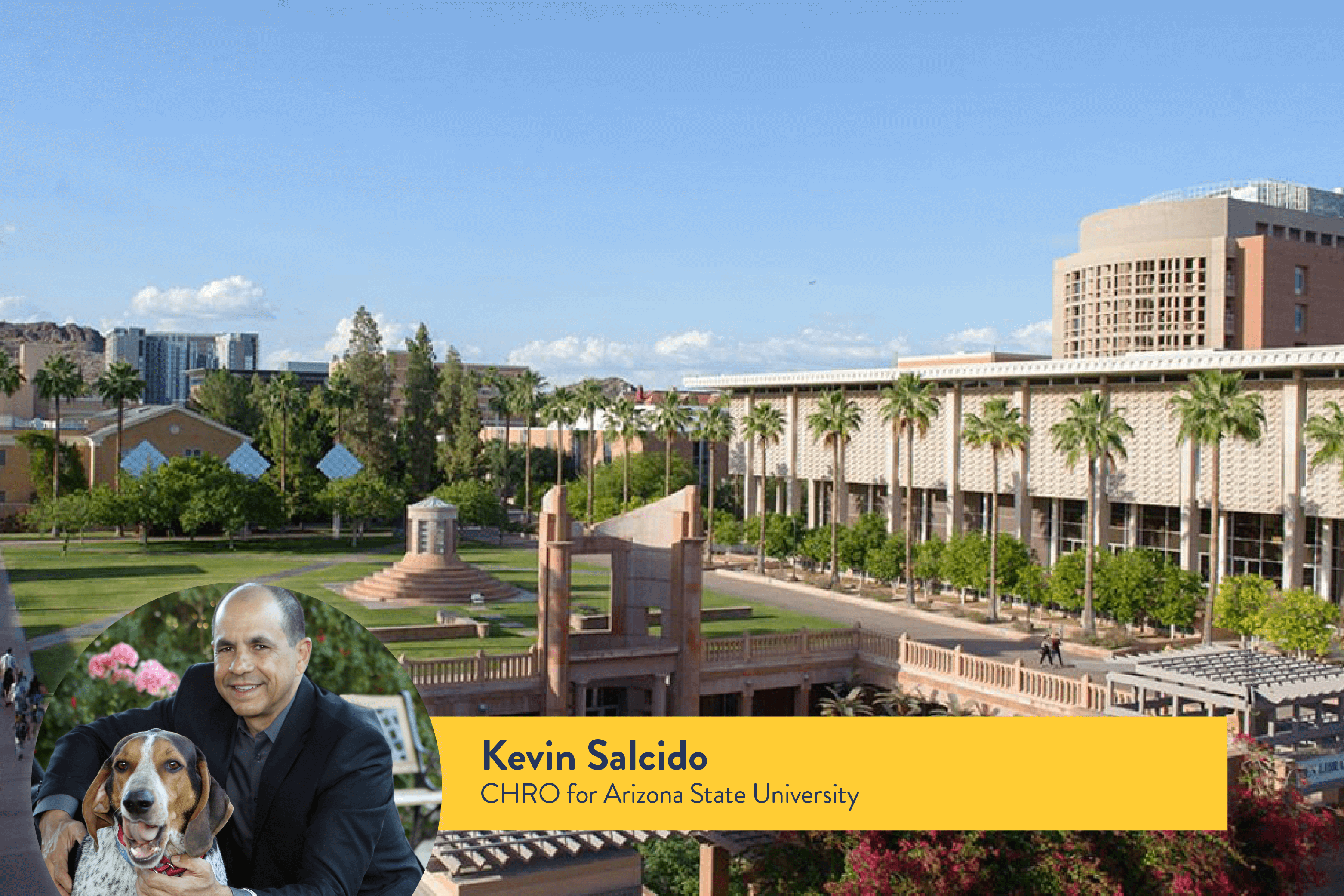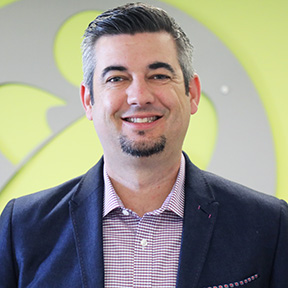
Kevin Salcido, CHRO, Arizona State University
On this episode of The 3rd Question we talk with Kevin Salcido, CHRO of Arizona State University, about what it means to employees to work at a place that provides ethical leadership and culture, as well as his duty to represent his "customers" --the alumni and the community.
Video Transcript
Ryan James:
Hello and welcome to The 3rd Question. My name is Ryan James, I'm your host. And today I am lucky enough to be joined by the CHRO of Arizona State University, Kevin Salcido. Kevin, thanks for joining us today.
Kevin Salcido:
Pleasure to be here, Ryan. I look forward to spending time with you.
Ryan James:
Thanks. Appreciate you carving out a little bit of time in this crazy world. We're going to ask you three questions, but before we do, I'd love if you could give a quick introduction of you, your history at ASU, what your role oversees and a little bit about the college itself.
Kevin Salcido:
And I've been at Arizona State University about 14 years now. I am the vice president, chief HR officer. We manage the central HR function for the university. ASU--Arizona State University as a public university. We are the largest public university under single governance in the country. We have about 120,000 students, 50,000 of whom are online, another 75, 80 [thousand] show up to class on one of our five campuses and other locations. We have locations in Los Angeles, Washington, D.C. and we have multiple international partnerships in Vietnam, Ireland, Russia, Switzerland, goes on and on and on. We are a state school with international reach.
Ryan James:
The first question is this, Kevin, as the CHRO for ASU, I've read where you've talked about modernization of processes, a lot of the programs you have, policies that have been in place and that those are the things you've been focused on. Let's say prior to COVID-19, what were some of those things, maybe some of the top ones? And then because of the current pandemic we're facing, has that shifted the focus at all? Or has in some ways accelerated some of those focuses?
Kevin Salcido:
Well, I think part of it is we have to have an understanding of how universities operate. Universities are really a collection of large organizations. We're very decentralized. For example, at ASU, I believe we have 17 or 18 colleges. The College of Engineering has 22,000 students, which would make it a fairly large university.
Ryan James:
By itself.
Kevin Salcido:
On its own right. There's not one way of managing a university. It's very diverse from a functional standpoint, there's also a model of shared governance in higher education, for the most part, or there's a faculty Senate, there's a staff council. And so one of the challenges here is how do you move an organization this large in one direction quickly? And I think what we're able to do, and not just ASU, a lot of universities were able to flip the switch when COVID became more and more of a threat. We moved 10,000 courses online over about a three week period, which was remarkable.
Kevin Salcido:
The reason we're able to do that is because we to focus on close collaboration. Even though we have this incredibly decentralized model, we had to get everybody moving together real quickly. Collaboration was key. We had to rely on quick decision making. Again, the higher education industry is not known for quick decision making. Decisions that literally would have taken a year to two years under normal circumstances, we had to make those decisions in about five or six weeks. I think we have to be very uncomfortable with ambiguity and uncertainty. Again, public institutions as a rule, do not deal well with uncertainty. We had an extreme communication challenge. How do you communicate across such a vast array of locations and up different types of disciplines? And I think at the end of day it's trust, trust, trust, trust.
Kevin Salcido:
I think what we've been able to do at ASU is create not so much an agency mindset where we're rules driven, process driven and we trust the process more than we trust our leaders. Here, we trust our leaders more than we trust the process. No, we didn't do everything right but I think for the most part, our faculty and staff gave us kind of the benefit of the doubt because they knew that we were dealing with an incredible challenging situation that we had to move through quickly.
Kevin Salcido:
We've had to create a mindset at ASU that we are really, we're an educational institution, but we're also a service institution because we're in competition for tuition payers because they're basically keeping us, that's where our revenue sources are. We can't sit back and rely on 40% or 45% state funding anymore. That's an old model and any kind of university that's kind of stuck in that old mindset where they're waiting for the legislature to give them money...boy, if they haven't adapted to this now they're never going to adapt.
Ryan James:
You're in a unique place. I have the privilege of talking to municipal and education thought leaders across the country, but from a higher ed perspective, you're unique in that you've got this...you've got kind of the next generation of thought leaders and talent pool always coming through your doors. Your customers, as you kind of described a second ago. You've always got this next group coming through. And I'm wondering, how do you, from an HR perspective, talent acquisition in public sector seems to be a continual challenge. And I wonder what you've done to kind of dip into that pool of talent that you have there at ASU? In two ways, one, younger generations have different expectations, whether that's the technology they use, the benefits they're provided, the career path that they're given versus maybe some of your more mature long-term employees. How do you work on that multi generational approach as the CHRO?
Kevin Salcido:
The workplace used to be the question that was asked was what can I do for my employer? Now, the question is asked is what can my employer do for me? That's been a fundamental shift that I've seen in my 30 years in human resources. We talk a lot about things like work-life balance. We talk about things like wellness, mental wellness, physical wellness, emotional wellness and we spend a lot of time on family-friendly policies. For example, recently we put in a lot of, we expanded our parental leave. We expanded our fertility subsidy. We expanded our adoption subsidy. We put in a volunteer pay program. I'm not saying that we invented these policies, but I think we were probably one of the first large public entities to adopt some of these policies from the private sector.
Kevin Salcido:
And if you don't create that culture that connects with people, they're just going to move on to the next opportunity. But I think at the end of the day, the younger generation is still very mobile, more mobile than they've ever been. If you look at the statistics, people are changing jobs more frequently than they ever have. I'm talking about pre-pandemic now because this is going to reset everything. Our challenge is to get that mindset, get people in here physically, but also get them connected emotionally. That's a challenge for us as well. But at the end of the day, I still think that people want ethical leadership, they want to be proud of the people that they work for, they want to be proud to say, "I work at a place that's known for an ethical leadership for an ethical culture." People want a positive culture and people want a place where they feel like, 'hey, I'm welcome, I connect with people in an individual level...' they don't want to be treated as just a cog in the machine.
Ryan James:
All right, well, we're going to get to this third question. The name of our show is The 3rd Question and the one for you as I'm going to pick today, some of the regular viewers have seen this. I pick some sort of time machine for my third question. Today, you get the book by HG Wells, The Time Machine, and what the question is, Kevin, you've been to at ASU for close to 14 years, like you mentioned, if I gave you that time machine and you could go back to any point in your current role, give yourself advice, change how you did things or tell yourself something, what would it be? And why?
Kevin Salcido:
It's a public trust to work at a university and you have to treat it as such. People have a great deal an affinity for the place where they went to school, whether they went to school there five years ago or 50 years ago. I think it took me a little bit of a time to realize that. I think that's part of the pleasure of working in a public entity like ASU. It's because it's just a bigger mission than maybe working in consumer products, working in software or something. Not that there's anything wrong with those industries, but I'm just saying it's a different mindset. People have put their trust in me to protect this institution.
Ryan James:
That's good. Well, Kevin, that's the time we have for today. I really appreciate you carving out a little bit of your time to share with our viewers. If any of you want to see more of these types of interviews, you can go to the3rdquestion.com, you can subscribe there and be notified when more interviews are posted. But for today, we're going to say thank you, Kevin, have a great week and thank you all for viewing. We'll be talking to you all soon. Bye bye.
Kevin Salcido:
See you later, Ryan.

